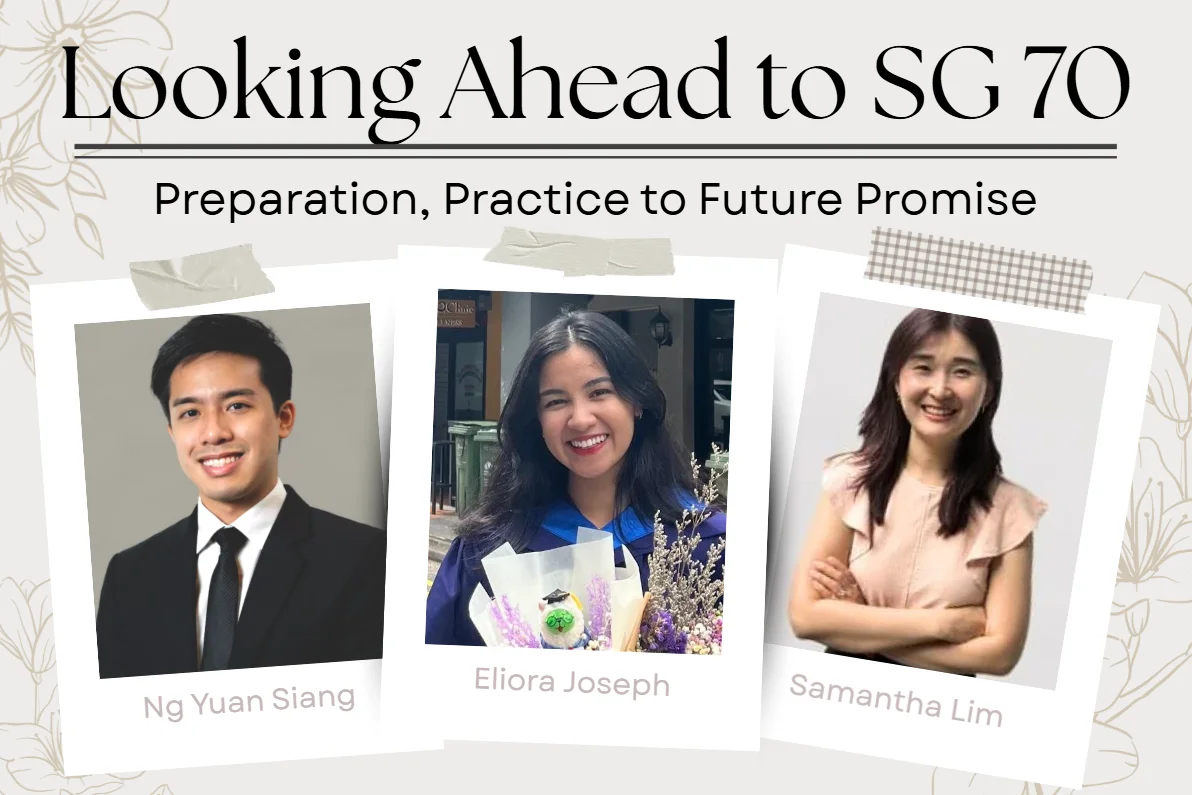
Looking Ahead to SG 70: from Preparation, Practice to Future Promise
Hear the thoughts and aspirations of the next general of legal minds looking to the future.
As Singapore marks its 60th year of nationhood, SG 60 serves as a milestone for the next generation of legal minds to consider their place in shaping the next chapter of the Republic.
We speak to a fresh law graduate, a lawyer, and a law librarian to reflect on their journeys in law and personal aspirations looking ahead to SG 70. Together, their voices capture the full arc of preparation, practice, and the promise of what lies ahead.
The Fresh Graduate: Stewardship and Wellness
For Eliora Joseph, 23, who just graduated from the National University of Singapore Faculty of Law, SG 60 is a moment to acknowledge a system internationally respected for its “efficiency, pragmatism and commitment to upholding the rule of law.” Yet she also sees unfinished work in building an inclusive justice system as “access to justice still remains uncertain for certain communities.” Nonetheless, she is encouraged by “the Judiciary and Bar’s commitment to improving access to justice” and is “excited to see how our justice system can become more inclusive.” She sees her generation’s role as one of “ensuring that law serves the community at large.”
To do so, Eliora stresses the importance of well-being for lawyers. “Young lawyers today face the challenges of being technically competent, responsive to clients, and not to mention the existential threat posed by AI. I truly believe that the importance of mental wellness cannot be overlooked. I hope that mentors acknowledge the importance of well-being and rest for junior lawyers, to ensure that we pace ourselves in the marathon of legal practice.”
At SG 70, her aspiration is clear: “a profession where access to justice is normalized” and where lawyers are supported to pursue sustainable and fulfilling career paths.
The Young Lawyer: Efficiency and Purpose
For Ng Yuan Siang, 28, Associate at Eugene Thuraisingam LLP, SG 60 represents both progress and paradox. He notes a legal system that is “headed towards new levels of efficiency.” Unlike the generations before him, most of his pre-trial conferences have been conducted over Zoom, freeing lawyers from the long waits that once defined physical hearings.
But with efficiency comes the new challenge of relentlessness. “Where there was previously pockets of downtime, some of these disappeared, which means more can be packed into a single day. While this is a good thing, it also adds to the pace of practice feeling more relentless, especially when coupled with the 24/7 connectivity that has come to be more or less expected these days.”
Despite these pressures, Yuan Siang remains grounded in the legal profession’s core purpose. “I felt it was a profession with real potential to help people, and that continues to be a big part of what keeps me going.” Beyond private practice, he counts himself fortunate to have worked on numerous pro bono and public interest matters, including CLAS and LASCO cases. He celebrates a more mature approach by the judiciary, particularly in how courts now approach issues involving mental disorders and vulnerable persons compared to decades past.
Yuan Siang’s hope is that institutions and leaders create the space for young lawyers to do meaningful work without being “constantly worn down by waves of work and constant pressures for billables.” Looking ahead to SG 70, his wish is “that our system stays principled and clear-eyed, and equips lawyers to collaborate across borders” in an uncertain world.
The Law Librarian: Knowledge and Inclusion
As a Senior Librarian at Singapore Management University, Samantha Lim, 31, reflects on SG 60 with pride in how far legal education has come, and concern the unevenness of opportunity. “We’ve come a long way, but the reality is that not everyone gets the same head start — there’s still a gap in access to resources. The question is, how do we keep legal education open and inclusive for all, no matter where someone begins?”
Her own contribution is in equipping students through information literacy training. In an era where AI is transforming legal research, she emphasizes the importance of discernment, “It’s important to teach them how to find and evaluate good information.”
Samantha also notes that information comes from lived experiences of practitioners. “It makes a huge difference when practitioners come back to share their real-world wisdom, giving students the insights they need to make informed career choices.”
At SG 70, she hopes to see legal education remain resilient by keeping pace with technology, while the profession embraces a more open and sustainable model of practice that values well-being and diverse career pathways.

